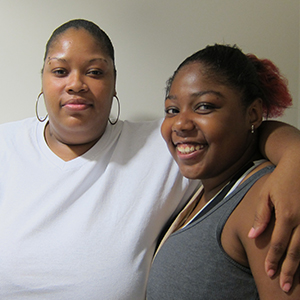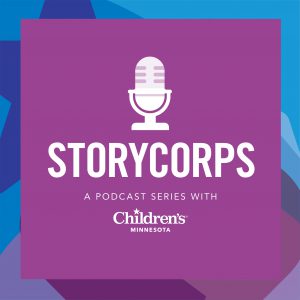Sickle Cell: Tamara and Candice’s story


About this episode
Mother, Candice, and daughter, Tamara, discuss the challenges sickle cell disease has presented, however they both stay rooted in their faith and also in their personal resilience values.
Topics:
- Diagnosis
- Sickle Cell Crisis: Complications
- Resilience: Faith, living with the unknown
Transcript
Candice: Hi. I’m Candice
Tamara: Hi. I’m Tamara. it’s hard for me. Sometimes I feel like giving up, but, then again, it’s something that makes me want to hold on, so it makes me proud, because I know I can do better and I can be stronger than what I am, and it turns out that I am. Well, I know it’s painful, but I know when I get transfusions it’s to help me, I have to make a lot of hospital visits to the clinic, or actually be in the hospital, and go to different specialists. Do you look at your life differently than before, now, since you know you had a kid that was diagnosed with sickle cell?
Candice: No, I consider my life the same, with just more challenges, more challenges and more happy-sad moments. So I can say the way that I was brought up was to never give up. I was always told God wouldn’t put nothing on you that you can’t handle. And when you first was born, and then three months later we found out you had sickle cell, I was scared, but I was also like, well, there’s nothing to be scared of. Because when don’t nobody else have your back, the man upstairs have your back. It was a lot of times I wanted to just give up and just be like, oh, my God, I can’t take it no more. I’m just going to give up and give her away. But I prayed about it, and I just kept on going. I just loved you, gave you the care that you needed, I have no regrets.
If I can change the hands of time, would I go back and say no, I wouldn’t have got pregnant and had you? Nope, I wouldn’t say that, either. I would say, if I can do it all over again, and if I had another child with the same disease, I’d do it all over again, in a heartbeat. My experience, it’s a good experience and a bad experience: bad, because this is something that a parent never would want to go through; good experience is just watching you grow. As you get older, you get more mature. How strong you are, how determined you are, A lot of days, I have to actually take time out to myself and pray and ask the Lord to give me the strength to help me get through a lot of difficult days. Like I said, as you’re getting older, you’re so mature. If I didn’t know you, I would think you were older. You’re very mature for your age.
So, what I’ve experienced, I would tell a parent with a child that does have the same disease that it’s hard, but it’s manageable. I mean, there’s people you can talk to, there’s other families you can talk to. Even the doctors. The doctors are great. The doctors are awesome. I love them all. I say, if you don’t have family, reach out to the hematology. They’re awesome. There’s nothing that they haven’t helped me with that I had a problem with that they have not gave me an answer or they couldn’t guide me in the direction to get the answer. Now, the medicines I say that has been a big impact on you was the hydroxyurea. That worked for a while, but then you were at risk of having another stroke, so, blood transfusion program, you was on that. This is your third time. But besides her getting blood every month, she’s pretty good, just only thing that I really worry about is the pain-wise. Like her aspirin is working; her pain meds work; the new medicine that they started her on, Elavil, I think that’s pretty much helping with her back pain — because she used to have back pain, But that’s been a big improvement. If there was any other medicine that she can take to help, that was out there, I would give it a try. But for now, the blood transfusion program, I think that’s working out very well. Who or what has helped you the most through this experience?
Tamara: You, and my family calling to check on me and stuff like that. It’s just, sometimes, I feel like I don’t have the support system. You know, it’s just me being a teenager. ith this sickle cell, everything is a miracle for me, because, to me, every time I’m in pain or something and feel like something’s going to go wrong, something really bad’s going to happen, anything’s a miracle for me if I can stop being in pain or just, you know, the simple stuff with the pain and stuff. When I was at risk of having another stroke with that TIA I had, that was the miracle, because that day, I really wanted to start crying, because I was in a hospital bed. I didn’t know what was going on, I just saw everybody over my head before and after I woke up. It was just a miracle, because, before, I just thought, ‘I’m going to die today.’ I always think that because I have sickle cell and I be in so much pain, I think so much can go wrong. So that was a miracle, that they had put me back on a blood transfusion to prevent having another stroke. So anything’s a miracle for me. That was a big miracle for me.
Candice: When I look at you or glance at you, I think I have a strong, beautiful, determined child. She doesn’t give up on anything. She’s determined to do everything. She has big dreams, she has goals. I just think you’re just so strong. I think you’re stronger than a lot of teenagers.
Tamara: I’m not going to lie. It’s most times I be wanting to give up so much, but I know I’m so determined. Whether it’s at school and I’m struggling and just frustrated, I try to get through it. Whether it’s through any activity, I know I’m strong, I know I can do it, even though I get frustrated.
Give to Children’s Minnesota during Sickle Cell Awareness Month
When you donate to Children’s Minnesota, you help families like Tamara’s. Your gift this month directly supports the cancer and blood disorders program at Children’s Minnesota, a team that cares for more than 3,000 kids — from babies to young adults — every year. We rely on your donations to surround every child in our Minnesota hospitals with the most extraordinary care: highly specialized, deeply compassionate, and designed to gives families strength when they need it most. Donate now at childrensmn.org/shinebrightforkids.
We wish to extend our thanks to the families who have shared their story here about the impact of living with hemophilia and sickle cell disease. We would also like to thank the many who worked on this project:
The Children’s Minnesota StoryCorps Legacy Team:
Eddie Gonzalez, Jocelyn Bessette Gorlin, Susan Kearney, Stephen Nelson, Margaret Heisel-Kurth, Stephanie Davis, Angela Blue, Elizabeth McDonough, Jill Swenson and Alisa Linne.
Special thanks to:
Stephanie Moua, Hamdi Hussein, Sadia Farah, Fatima Ali, Caillyn Costello, Suzanne Lehman, Suzan Ulrich, D'Ann Urbaniak Lesch, Justin Nelson, Allison Albright, Marvin Holmes-Leopold, Jose Rodriguez and Mitch Hare.
Minneapolis Institute for Production and Recording:
Jose Rodriguez and Mitch Hare.